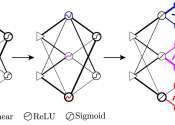Connecticut i/kəˈnɛtɨkət/ is a state in the New England region of the northeastern United States. It is bordered by Rhode Island to the east, Massachusetts to the north, and the state of New York to the west and the south (with which it shares a water boundary in Long Island Sound).
Connecticut is named for the Connecticut River, the major U.S. river that approximately bisects the state. Its capital city is Hartford. Much of southern and western Connecticut (along with majority of the state's population) is part of the New York metropolitan area; three of Connecticut's eight counties are statistically included in the New York City combined statistical area, the same area is widely referred to as the Tri-State area. Connecticut's center of population is in Cheshire, New Haven County, which is also located within the Tri-State area.
Connecticut is the 29th most populous state, with 3.5 million residents, and is ranked 48th in size by area, making it the 4th most densely populated state. Called the Constitution State, Nutmeg State, and "The Land of Steady Habits", Connecticut was influential in the development of the federal government of the United States.
Connecticut's first European settlers were Dutch and established a small, short-lived settlement in present-day Hartford at the confluence of the Park and Connecticut rivers, called Huys de Goede Hoop. Initially, half of Connecticut was a part of the Dutch colony, New Netherland, which included much of the land between the Connecticut and Delaware rivers.
The first major settlements were established in the 1630s by the English. Thomas Hooker led a band of followers overland from the Massachusetts Bay Colony and founded what would become the Connecticut Colony; other settlers from Massachusetts founded the Saybrook Colony and the New Haven Colony. Both the Connecticut and New Haven Colonies established documents of Fundamental Orders, considered the first constitutions in North America. In 1662, the three colonies were merged under a royal charter, making Connecticut a crown colony. This colony was one of the Thirteen Colonies that revolted against British rule in the American Revolution.
The Connecticut River, Thames River, and ports along the Long Island Sound have given the state a strong maritime tradition, which continues today. Connecticut's other traditional industry is financial services; for example, insurance companies in Hartford and hedge funds in Fairfield county. As of the 2010 Census, Connecticut features the highest per capita income, Human Development Index (0.962), and median household income in the United States. Although Connecticut is a wealthy state by most measures, the income gap between its urban and suburban areas is striking, with several of Connecticut's cities ranking among the nation's poorest and most dangerous.








